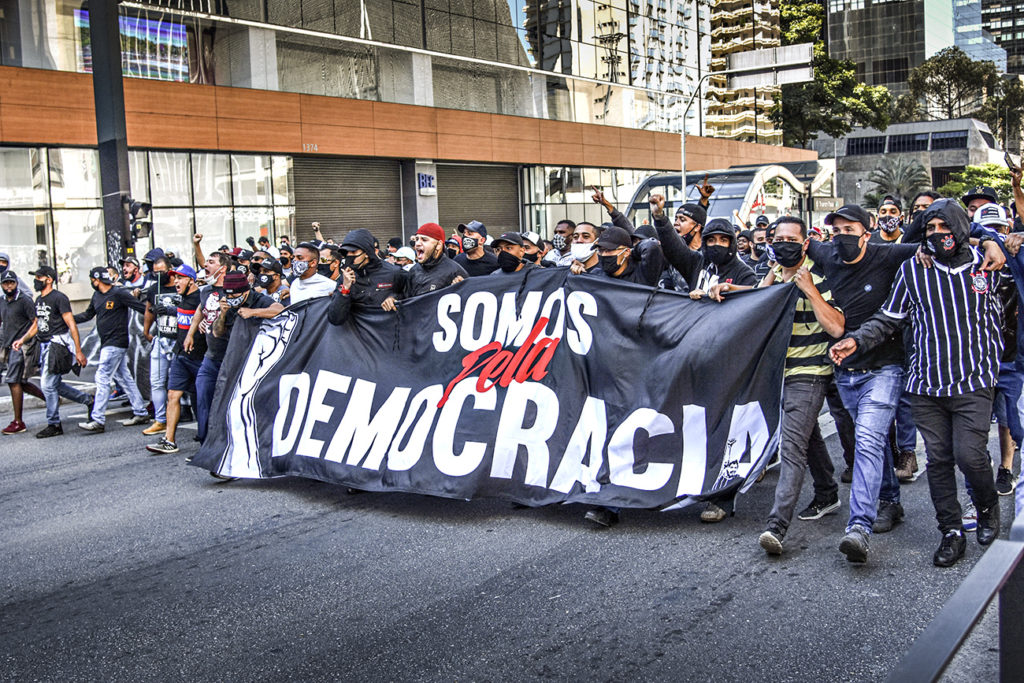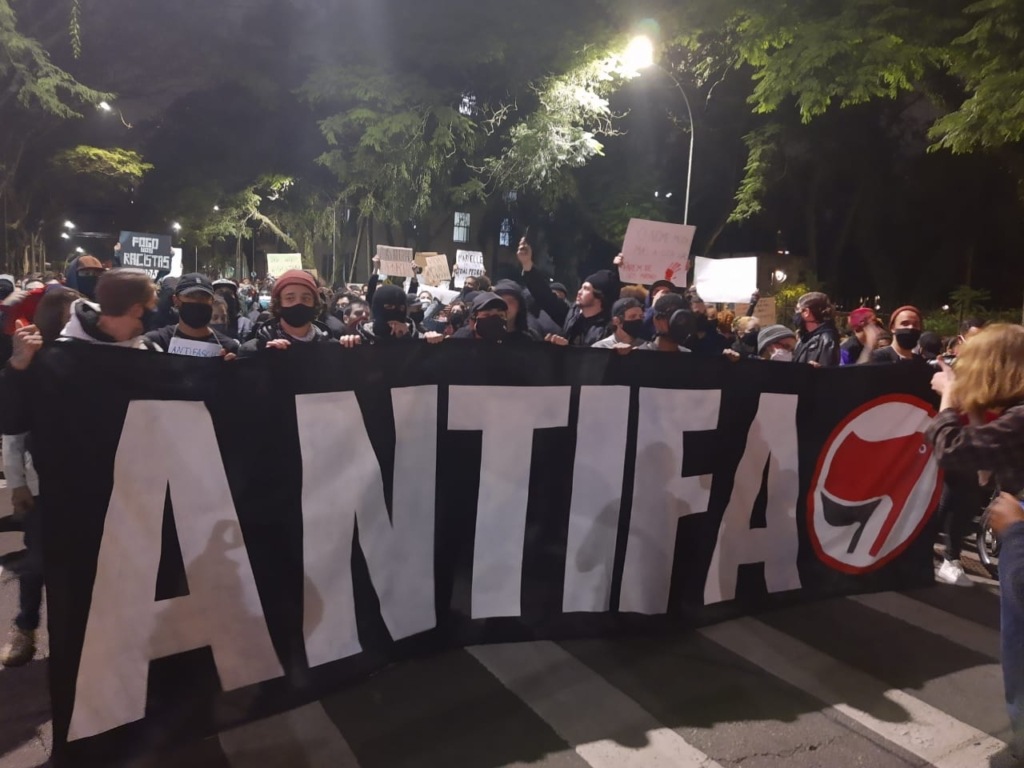RIO DE JANEIRO, BRAZIL – Since the start of quarantine enforced by the Coronavirus pandemic, no demonstration critical of Jair Bolsonaro’s government had produced as much commotion in the streets as the anti-fascist rally summoned by anti-fascist soccer fan organizations on Paulista Avenue this Sunday.

In defense of democracy, soccer fan organizations also staged coordinated protests in at least 15 other cities, such as Belo Horizonte, Porto Alegre, and Rio de Janeiro, where fans of Rio de Janeiro’s top clubs marched against racism.
The mobilization came from anti-fascist organizations, although the leaders of organized soccer fan groups such as Gaviões da Fiel (Corinthians) and Torcida Jovem (Santos), which rejected the presence of Bolsonaro at the Santos club’s Vila Belmiro stadium and took a stand against his candidacy in the presidential election, have supported and taken part in the rallies.
The 200-member strong National Association of Organized Soccer Fans (ANATORG), also joined the protest, while pointedly emphasizing that the demonstration “is neither right nor left-wing”, but rather in opposition to ultraconservative, supremacist and fascist movements.
“Our protest arose from an independent organization of the Gaviões club member fans,” says Danilo Pássaro, 27, leader of the Corinthian ‘We are for Democracy’ movement. “We have a shared concern about the authoritarian escalation in the country, from a wave of attacks against health professionals and journalists, prompting the rupture of the Constitutional boundaries, legitimized by the President of the Republic. Thus, even in this pandemic time, we took the risk and decided to join this dispute in the streets to uphold democracy”.
It was agreed among the participating groups that they would not identify themselves with club symbols or flags, so that the demonstration would not be officially linked to participating organized soccer fan groups.
In early May, the movement launched a counter-attack on demonstrations prompted by Bolsonarist supporters, with a rally of some 70 Corinthians supporters in Paulista Avenue, held at the same time as the far-right protest. The repercussion raised the support of anti-fascist soccer fan organizations from Corinthians’ local rival clubs Palmeiras, São Paulo, and Santos, and inspired the emergence of further similar groups, such as the Resistência Alvinegra, which mobilized some 200 fans of the hugely popular Atlético Mineiro soccer club in downtown Belo Horizonte on two consecutive weekends.
Founded five years ago, the Resistência Azul Popular (RAP), composed of fans of Belo Horizonte team Cruzeiro, is considering joining the national movement but is still discussing a plan of action on how to protest safely during social isolation measures and prevent clashes with far-right groups.
In both São Paulo and Rio de Janeiro, there have been clashes between anti-fascist soccer fans and Bolsonarists, followed by police repression. On Paulista Avenue, tensions built up when the fans’ protest had already ended after a number of ultra-conservative protesters displayed alleged pro-Nazi symbols as a form of provocation.
The São Paulo State Police forwarded pictures to the Prosecutor’s Office to investigate those behind the riot, in addition to determining whether the flags displayed by the group supporting Bolsonaro are in fact related to neo-Nazi movements.
Left-wing parties were not indifferent to the mobilization. While the São Paulo Workers’ Party (PT) celebrated the march organized by anti-fascist soccer fans, Socialism and Liberty Party (PSOL) federal deputies Sâmia Bomfim and Glauber Braga, took part in the São Paulo rally. “By using the pandemic’s reality to push ahead with his authoritarian project, Bolsonaro puts Brazil on the edge. The rally of soccer fan organizations in São Paulo was the result of this: the people can’t stand it anymore,” said the deputy, who also criticized the police action in dispersing the protest.
“The State Police acted in a brutally repressive way against the organized fans and coddled the fascists, as the videos show”. In footage taken by demonstrators, a woman carrying a baseball bat and teasing fans is shown being escorted by a police officer.
In the opposite trench, politicians aligned with Bolsonaro raised the tone against the soccer fans’ demonstrations. On Monday, the President’s son, Federal Deputy Eduardo Bolsonaro, filed formal complaints with the Prosecutor General’s Office against Sâmia Bomfim and Glauber Braga, inferring the deputies’ involvement in alleged “criminal activities with the Anti-fascist group”.
Like Donald Trump, who is facing protests from antiracist movements in the United States, the Bolsonaro family suggests classifying anti-fascist groups as terrorist organizations. In 2015, the Social Liberal Party (PSL) leader in the Senate, Major Olimpio, currently estranged from Bolsonarism, had proposed dissolving the organized soccer fans by deeming them as criminal groups in a bill currently being processed in Congress.
“Here they [anti-fascists] are dressed up as organized soccer fans, but we all know that what they want is chaos, disorder, and confrontation with peaceful demonstrations,” Eduardo Bolsonaro wrote.
In Rio, PSL Federal Deputy Daniel Silveira, who followed a pro-Bolsonaro rally on Copacabana beach, recorded a video advocating violent repression of anti-fascist soccer fan organizations.
“You [anti-fascists] are going to run into an angry police officer in the crowd, get shot in the middle of the chest, and call us violent. I’m rooting for that. Who knows, maybe I will be the lucky one. It’s no use even saying it was murder. It will be self-defense,” threatened the deputy, who filmed a conversation during the protest with a police officer who promised to burn the Flamengo fans’ banner stamped with the words “Red-Black Democracy”.
The Rio de Janeiro State Police said in a statement that the officer’s behavior “does not reflect the force’s position, which remains impartial, always safeguarding democracy”.
The opposition to Bolsonaro is not consensual among the organized soccer fans, and has generated discomfort among members who prefer to avoid associating with anti-fascist movements. One of São Paulo soccer club’s largest organized groups, Dragões da Real, said that although it considers itself an anti-fascist organization, it does not intend to guide its members to follow a specific political direction. “What unites us is the São Paulo Football Club. Other than that, everyone should choose their own path. No democracy is practiced with anti-democratic action”.
The Torcida Jovem do Flamengo soccer fan organization follows the same line, stating that “it will not compel or encourage any of its members to demonstrate against or in favor of any political spectrum or ideology” since it is positioned as a nonpartisan institution.

New rallies, protest in Curitiba, and demonstrations against the Government
If the organized groups prefer to distance themselves from the protests, the anti-fascist soccer fan organizations plan to increase the number and magnitude of their actions with the support of social and party movements that oppose the Bolsonaro government. This weekend, a manifesto for democracy, already signed by famous ex-players Casagrande, Raí and Tostão, passed the 200,000 signatures mark. For next Sunday, cities like Manaus and Rio are organizing demonstrations similar to that on Paulista Avenue.
“Our agenda is broad, it has no party-political slant,” says Danilo Pássaro. “The majority of Brazilians are in favor of democracy. We call on all democratic citizens to join in this struggle”.
The national coordinators of the Torcidas Antifascistas Unidas (United Anti-Fascist Soccer Fans) points out that it orients demonstrators to wear masks, gloves and goggles for protection against the coronavirus, in addition to recommending fans who live with people in the risk group to join political protests exclusively through social media.
On Monday, there was a demonstration in Curitiba that once again led to police repression and clashes, proving that the spark of anti-fascist and anti-Bolsonaro protests, combined with antiracist rallies in the wake of the movement in the US, should follow.
Gabriel Fidgan, organizer of the protest in the capital of Paraná, stated that the antiracist rally was ending with no incidents when, when “some were dispersing, there was vandalism against the public property,” which “represents the organized presence of infiltrators who want the movement to be criminalized”. Fidgan also criticized the excessive use of force by the police.
Alongside the street protests, the weekend also saw another front against the government appear, with protests criticizing the government’s authoritarian statements and onslaughts against other governmental branches. One of the movements – “Somos 70%” (We are 70%) – alludes to the majority of the populace that does not support Bolsonaro. “Basta!” (Enough!) was organized by attorneys and other representatives of the legal community.
The “Estamos Juntos” (We Are Together) manifesto was signed by artists and intellectuals, but also politicians of various penchants, such as former President Fernando Henrique Cardoso (PSDB), former Mayor of São Paulo Fernando Haddad (PT) and the Governor of Maranhão, Flávio Dino (PCdoB). The text speaks of the significance of a common front against the Planalto. “As was the case in the ‘Diretas Já’ movement, it is time to set aside internal squabbles in search of the common good,” says the text.
The movements are a symptom of the escalating institutional crisis, but they also show that it will not be easy to build a broad anti-Bolsonarist front. On Monday, former president Luiz Inácio Lula da Silva criticized the manifesto for insufficiently stressing the defense of workers’ rights, and for including names that supported Bolsonaro.
Source: El País

